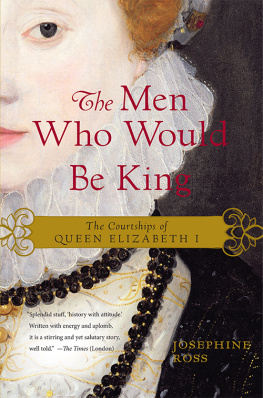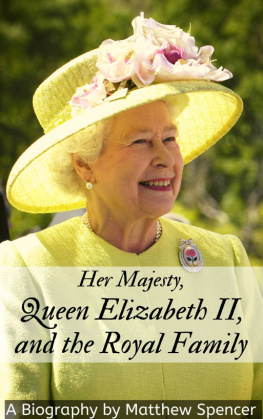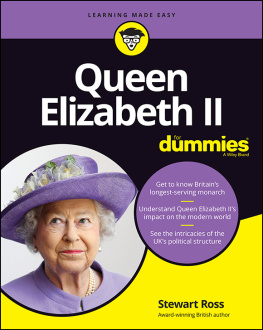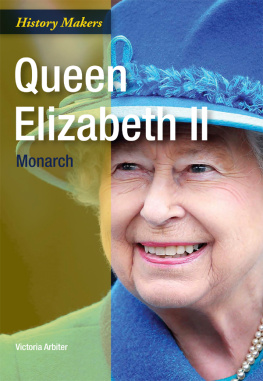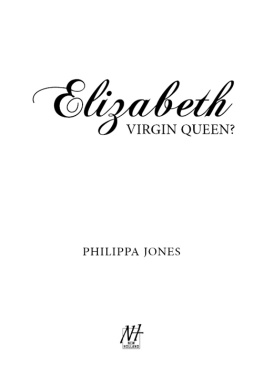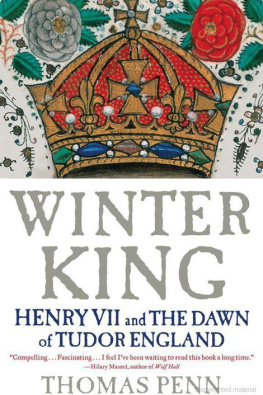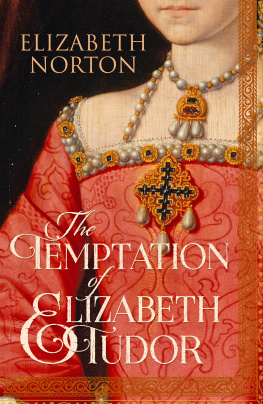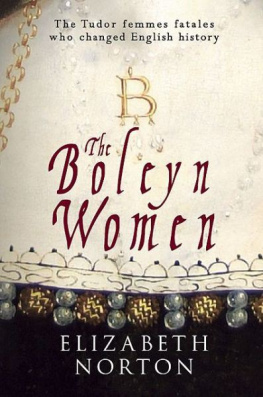Whoso list to hunt, I know where is a hind
But as for me, alas, I may no more.
The vain travail hath wearied me so sore,
I am of those that farthest come behind.
Yet may by no means my wearied mind
Draw from the deer, but as she fleeth afore,
Fainting I follow. I leave off therefore,
Since in a net I seek to hold the wind.
Who lists her hunt, I put him out of doubt,
As well as I may spend his time in vain;
And graven with diamonds, in letters plain,
There is written her fair neck round about,
Noli me tangere, for Caesars I am,
And wild for to hold, though I seem tame.
T he pursuit of Elizabeth Tudor was the greatest hunt in history. For more than half a century, kings, princes, nobles, and knights, Frenchmen, Austrians, Spaniards, Swedes, and mere English joined the chase, lured by the magnificent quarry who pranced before them, leaping away, doubling back, sometimes halting and seeming to yield, but always at last disappearing over the horizon. Instinct and experience taught Elizabeth not to surrender, but political expediency, emotional cravings, and the exhilaration of the sport combined in her head and heart to keep the great hunt going. From her babyhood into her old age, in spite of her avowals of perpetual virginity, in spite of rich rumors to the contrary, the most splendid men in Europe succeeded one another in the field as suitors to the queen.
Noli me tangere do not touch me; it would have been a fitting motto for Elizabeth, but she was not born when Sir Thomas Wyatt wrote the sonnet, bitter with love for her mother, Anne Boleyn. Giddy, seductive Anne had no need of lesser lovers such as Wyatt while Henry VIII, Englands mighty Caesar, courted her with exuberant tenderness, drawing hearts and initials on his love letters like a schoolboy, disrupting the religious and social orders to make her his wife. She was not a classic beauty, but she had the luscious dark eyes and nervy delicacy of a doe, and she dressed with sophisticated, expensive taste; above all, she knew how to make men ache with desire. Women in the London crowds shouted abuse at her and the imperial ambassador Chapuys sneered knowingly and referred to her as the Concubine in his dispatches. After the birth of Elizabeth, in September 1533, he wrote, The christening has been like her mothers coronation, very cold and disagreeable both to the court and to the city. It was a serious blow to Henry VIII that the baby, born seven months after his marriage to Anne, was not a boy; however, the new queens ability to bear children was now proved, and the all-important male heir to the throne would no doubt follow. The baby Elizabeth was healthy and indeed had a certain value as bait for a future foreign marriage alliance. But the kings passion for his wife faded as the months paced on and no son was born. Annes brittle charm cracked into neurosis, her peals of inappropriate laughter sounded hysterical, her shrewishness vented itself in orders to threaten and bully the kings disgraced elder daughter, Mary. More than ever Anne seemed wild for to hold, carelessly coquettish with any man from the common musician Mark Smeaton to her own brother Viscount Rochford, flirting and teasing and fishing for compliments, seeking reassurance that she was still desirable. Then, in January 1536, she gave birth prematurely to a stillborn boy, and Henry had no more tolerance.
Noli me tangere ... the lascivious incitements by which she roused her lovers included touchings, it was stated at her trial. The bald obscenity of the official reports had nothing in common with Wyatts courtly erotic yearnings, or the kings boisterous love letters. The world heard from Westminster that the queen had procured and incited her own natural brother, George Boleyn, Lord Rochford, Gentleman of the Privy Chamber, to violate and carnally know her, with her tongue in the said Georges mouth, and the said Georges tongue in hers, and also with open-mouthed kisses, gifts and jewels. Five men altogether were condemned to death as her lovers. Anne was judged guilty of carnal adulterous lusts, of despising Gods commands and human laws, and Chapuys informed his emperor that she was also charged, and her brother likewise, with having laughed at the King and his dress.
The mocked king made no secret of his joy at the condemnation of his wife that released him from her. Already it sounds ill in the ears of the people, Chapuys reported with interest, that the King, having received such ignominy, has shown himself more glad than ever since the arrest of the whore, for he has been going about banqueting with ladies, sometimes remaining after midnight, and returning by the river. Seven miles up the river Thames, prim, pretty Jane Seymour was lodged in state. Down the river, below London Bridge with its crammed houses and shops, lay the dark bulk of the Tower, where Anne Boleyn was waiting to die. The constable of the Tower, Sir William Kingston, reported with surprise that she was very merry; she kept laughing, he wrote, and once she joked, I heard say the executor was very good, and I have a little neck, and then she put her hand about it, laughing heartily. She was beheaded on Tower Green on May 19, not laughing, but looking exhausted and amazed.
Among the bills left unpaid at Anne Boleyns death were listed expensive items for her little daughtercaps of satin and taffeta; satin and crimson fringe for the childs cradle. Elizabeth was nearly three when her mother was condemned to death by her father. She had been taken from the queen shortly after her birth, and a royal nursery had been established, first at the old wooded manor of Hatfield, then at stately Eltham Palace, and later at Hunsdon, in Hertfordshire, but despite the official separation she had seen her parents often during her babyhood. For the first two years of her life Elizabeth was the heir presumptive to the English throne, Henrys eighteen-year-old daughter, Mary, by his divorced wife, Catherine of Aragon, having been declared a bastard. There seemed little prospect that Elizabeth would actually inherit, for the king was in his lusty prime, and would surely beget sons to supersede her, but in the meantime she was the High and Mighty Princess of England, and both Henry and Anne were proud and fond of her. Two years before he was called upon to act as royal jailer, Sir William Kingston had written enthusiastically, Today the King and Queen were at Eltham, and saw my Lady Princessas goodly a child as has been seen. Her Grace is much in the Kings favor, as goodly child should be, God save her. In January 1536, only five months before Annes disgrace, Elizabeth was summoned to Hampton Court to take part in the kings unbridled rejoicings at the death of his scorned and repudiated former wife, Catherine of Aragon. The little princess was paraded to Mass to the tingling blast of trumpets and other great triumphs, and late that evening the king, dressed from head to foot in yellow, except for the white feather in his cap, sent for his daughter and then swung her up in his huge arms and carried her about, boisterously showing her off to the company. By May, however, his elation had evaporated. It was claimed, years later, that just before Annes arrest he had been seen at a window of Greenwich Palace, staring frozenly out into the courtyard below, while Anne stood weeping beside him apparently pleading with him, holding Elizabeth out to him beseechingly. Such vivid, disturbing scenes outside the familiar nursery world would surely remain in a childs uncomprehending memory, to sink into the layer of impressions with which the subconscious mind is lined.
Incidents remembered, servants whispers, awkward answers to casual prattled questionsthere were many ways in which Elizabeth would have absorbed information. No doubt efforts were made to protect her from the disturbing knowledge of her mothers shocking death, but in a large household consisting almost entirely of servants, with a fond governessLady Bryanwho was a cousin of the late queen, it is not likely that the child remained for long in total ignorance of the event. It might have seemed as unreal as a fairy story, as personally unrelated as tales of Robin Goodfellow or King Arthurs knights, had the drama not been constantly repeated with living protagonists throughout Elizabeths childhood, becoming the reality of her own experience. In each of her fathers subsequent marriagesElizabeth was a veteran of five marriages by the time she was ten years oldthe same picture was embellished, fresh layers of paint laid on the sketch of her own earliest impressions. The king, her mighty royal father, the image of towering masculinity, possessed utter power over each vulnerable, disposable wife who bound herself to him in wedlock.

